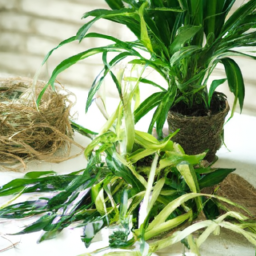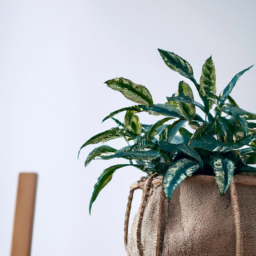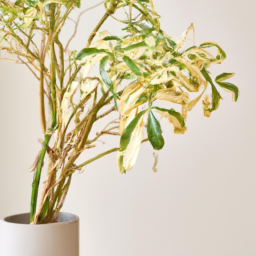
Have you ever wondered why indoor plants are good for you? Whether you’re a seasoned plant parent or just starting to bring greenery into your home, there are numerous benefits to having indoor plants. From improving air quality to reducing stress levels, indoor plants can have a positive impact on your overall well-being. In this blog post, we’ll explore the reasons why indoor plants are good for you and how they can enhance your living space. So grab a cup of tea, sit back, and let’s dive into the wonderful world of indoor plants!
Benefits of Indoor Plants for Health and Well-being
Welcome to our guide on the benefits of indoor plants for health and well-being. Indoor plants have been known to provide numerous advantages for both physical and mental health. In this article, we will explore the various ways in which indoor plants can positively impact your well-being.
Improved Air Quality
One of the most well-known benefits of indoor plants is their ability to improve air quality. Plants absorb carbon dioxide and release oxygen through the process of photosynthesis, which can help to purify the air in your home or office. In addition, plants can also remove toxins and pollutants from the air, such as formaldehyde and benzene, which are commonly found in indoor environments.
Studies have shown that having indoor plants can reduce symptoms of respiratory conditions, such as asthma and allergies, by improving air quality. By introducing plants into your indoor space, you can create a healthier environment for yourself and your family.
Furthermore, certain plants, such as the spider plant and peace lily, are known for their air-purifying properties and can be particularly beneficial for improving indoor air quality. Consider adding these plants to your home or office to reap the benefits of cleaner air.
Stress Reduction
Indoor plants have also been shown to have a positive impact on mental health by reducing stress and anxiety. The presence of plants in indoor spaces has been linked to lower levels of cortisol, the stress hormone, and increased feelings of calmness and relaxation.
Research has found that simply being around plants can help to lower blood pressure and heart rate, leading to a greater sense of well-being. In addition, caring for plants can also have therapeutic effects, as it provides a sense of purpose and accomplishment.
Creating a green oasis in your home or office with a variety of indoor plants can help to create a peaceful and serene environment. Consider incorporating plants with different shapes, sizes, and textures to create a visually appealing space that promotes relaxation and reduces stress.
Boosted Productivity
In addition to improving air quality and reducing stress, indoor plants can also help to boost productivity and creativity. Studies have shown that having plants in indoor workspaces can increase concentration, memory retention, and overall cognitive function.
The presence of plants in the workplace has been linked to improved job satisfaction and morale among employees. Greenery in the office can help to create a more pleasant and inviting atmosphere, leading to higher levels of motivation and productivity.
Consider adding plants to your desk or workspace to enhance your creativity and productivity. Plants such as succulents, cacti, and pothos are low-maintenance options that can thrive in indoor environments and provide numerous benefits for your well-being.

Why Indoor Plants Are Good
How Indoor Plants Improve Air Quality in Your Home
Introduction
Indoor plants are not just a beautiful addition to your home decor, they also have numerous health benefits. One of the most significant benefits of having indoor plants is their ability to improve air quality in your home. In this article, we will explore how indoor plants can help purify the air you breathe and create a healthier living environment for you and your family.
Indoor plants are natural air purifiers that can help remove toxins and pollutants from the air. They do this through a process called photosynthesis, where they absorb carbon dioxide and other harmful gases and release oxygen into the air. This process can help improve the air quality in your home by reducing the levels of indoor air pollutants such as formaldehyde, benzene, and trichloroethylene.
Research has shown that indoor plants can also help increase humidity levels in your home, which can be beneficial for your respiratory health. Dry indoor air can lead to respiratory problems such as dry throat, coughing, and irritated sinuses. By adding indoor plants to your living space, you can help maintain optimal humidity levels and improve your overall well-being.
Benefits of Indoor Plants for Air Quality
1. Indoor plants act as natural air filters, removing toxins and pollutants from the air and releasing oxygen into your home environment. This can help reduce the risk of respiratory problems and improve overall air quality.
2. Certain indoor plants, such as spider plants and peace lilies, are known for their ability to absorb harmful chemicals like formaldehyde and benzene. By having these plants in your home, you can create a healthier living space for you and your family.
3. Indoor plants can help increase humidity levels in your home, which can be particularly beneficial during the dry winter months. By maintaining optimal humidity levels, you can prevent respiratory issues and keep your indoor air quality at its best.
Tips for Choosing Indoor Plants
When selecting indoor plants for your home, it’s important to choose varieties that are known for their air-purifying properties. Some popular options include spider plants, peace lilies, snake plants, and pothos. These plants are easy to care for and can thrive in a variety of indoor environments.
Consider the size of your space and the amount of natural light available when choosing indoor plants. Some plants require more sunlight than others, so be sure to place them in a location where they can receive adequate light throughout the day.
Regularly water and maintain your indoor plants to ensure they stay healthy and continue to purify the air in your home. Dust the leaves regularly and check for any signs of pests or disease. By caring for your indoor plants properly, you can enjoy their air-purifying benefits for years to come.

The Psychological Benefits of Having Indoor Plants in Your Living Space
Reduced Stress and Anxiety
One of the most significant psychological benefits of having indoor plants in your living space is the reduction of stress and anxiety. Research has shown that being around plants can help lower cortisol levels, which are often elevated during times of stress. The presence of greenery indoors can create a sense of calm and relaxation, making it easier to unwind after a long day.
In addition, indoor plants have been found to improve air quality by removing toxins and releasing oxygen, which can have a positive impact on overall well-being. Breathing in fresh, clean air can help alleviate feelings of anxiety and promote a sense of tranquility in your home.
By incorporating indoor plants into your living space, you can create a peaceful environment that promotes mental and emotional well-being. Whether you choose to place a few small plants on a windowsill or create a lush indoor garden, the presence of greenery can have a profound effect on your mood and stress levels.
Improved Concentration and Productivity
Another psychological benefit of having indoor plants in your living space is the improvement of concentration and productivity. Studies have shown that being surrounded by plants can help increase focus and cognitive function, making it easier to stay on task and complete work efficiently.
The presence of greenery indoors can also help reduce mental fatigue and improve overall mood, leading to a more positive and productive work environment. Whether you work from home or in an office setting, incorporating indoor plants into your space can help create a more conducive atmosphere for concentration and creativity.
In addition, caring for indoor plants can provide a sense of purpose and accomplishment, which can boost self-esteem and motivation. By tending to your plants and watching them thrive, you can experience a sense of fulfillment that can translate into increased productivity and success in other areas of your life.
Enhanced Mood and Overall Well-Being
Indoor plants can also have a significant impact on your mood and overall well-being. The presence of greenery in your living space can help create a sense of connection to nature, even when indoors, which can have a positive effect on mental health and happiness.
Studies have shown that being around plants can help reduce feelings of depression and increase feelings of positivity and well-being. The act of caring for plants and watching them grow can be therapeutic and rewarding, providing a sense of purpose and joy in your daily life.
By incorporating indoor plants into your living space, you can create a more inviting and uplifting environment that promotes emotional health and happiness. Whether you choose to fill your home with lush foliage or keep a few small plants scattered throughout, the presence of greenery can have a profound impact on your mood and overall well-being.
Let’s recap
Indoor plants are more than just decorations – they can actually have a positive impact on our health and well-being. Studies have shown that having plants in our living spaces can help improve air quality by absorbing toxins and releasing oxygen. This can lead to better respiratory health and overall well-being for those who live or work in the space.
In addition to their air-purifying qualities, indoor plants can also have a calming effect on our mental health. The presence of greenery has been shown to reduce stress and anxiety levels, as well as improve mood and productivity. Taking care of plants can also provide a sense of purpose and accomplishment, boosting our self-esteem and overall happiness. So next time you’re looking to spruce up your space, consider adding some indoor plants not just for their aesthetic appeal, but for the numerous benefits they can bring to your health and well-being.
Common Questions and Answers:
Q1: What are the benefits of having indoor plants?
A1: Indoor plants are good for a variety of reasons. They can improve air quality by absorbing carbon dioxide and releasing oxygen. They also add a touch of nature to indoor spaces, reduce stress, and boost mood and productivity.
Q2: How do indoor plants improve air quality?
A2: Indoor plants are natural air purifiers. They absorb toxins and pollutants from the air through their leaves and roots, helping to create a cleaner and healthier indoor environment for you to breathe in.
Q3: What are some easy-to-care-for indoor plants for beginners?
A3: If you’re new to caring for indoor plants, some easy-to-care-for options include pothos, snake plants, spider plants, and peace lilies. These plants require minimal maintenance and can thrive in a variety of indoor conditions.
Q4: How do indoor plants help reduce stress and boost mood?
A4: Studies have shown that being around plants can help reduce stress levels and improve mood. The presence of indoor plants can create a calming and relaxing atmosphere, making it easier to unwind and de-stress after a long day.
Q5: What are some tips for caring for indoor plants?
A5: To care for your indoor plants, make sure to water them regularly, provide them with adequate sunlight, and dust their leaves occasionally. It’s also important to monitor for pests and diseases, and repot them as needed to ensure they continue to thrive.
Dr. Olivia Green is a botanist with over two decades of experience in indoor plant cultivation. She holds a Ph.D. in Plant Biology and has dedicated her career to researching plant behavior in controlled environments. Dr. Green is passionate about helping plant enthusiasts master the art of indoor gardening through her extensive knowledge and practical insights.


